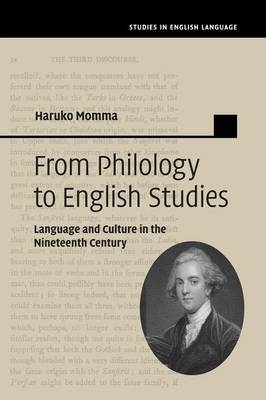
From Philology to English Studies
Language and Culture in the Nineteenth Century
Seiten
2015
Cambridge University Press (Verlag)
978-1-107-51561-1 (ISBN)
Cambridge University Press (Verlag)
978-1-107-51561-1 (ISBN)
An examination of the influence of nineteenth-century philology on European thought. Haruko Momma considers, among other matters, the impact of William Jones's discovery of Sanskrit on historical studies of language and culture, the Philological Society's role in the making of the OED, and the rise of English studies at universities.
The study of English language and literature in Britain changed dramatically between the end of the eighteenth century and the beginning of the twentieth. From Philology to English Studies explores the contribution of philology to this movement. Haruko Momma charts both the rise and fall of philology from antiquity to the late eighteenth century, and the impact of modern philology on the study of modern languages and literatures. Focusing in detail on the work of key philologists in the nineteenth century, Momma considers how they shaped European discourse and especially vernacular studies in Britain: William Jones's discovery of Sanskrit in British India gave rise to Indo-European studies; Max Müller's study of this same language helped spread the Aryan myth to the English-speaking world; the OED achieved its greatness as a post-national lexicon under the editorship of James Murray, a dialectologist originally from Scotland.
The study of English language and literature in Britain changed dramatically between the end of the eighteenth century and the beginning of the twentieth. From Philology to English Studies explores the contribution of philology to this movement. Haruko Momma charts both the rise and fall of philology from antiquity to the late eighteenth century, and the impact of modern philology on the study of modern languages and literatures. Focusing in detail on the work of key philologists in the nineteenth century, Momma considers how they shaped European discourse and especially vernacular studies in Britain: William Jones's discovery of Sanskrit in British India gave rise to Indo-European studies; Max Müller's study of this same language helped spread the Aryan myth to the English-speaking world; the OED achieved its greatness as a post-national lexicon under the editorship of James Murray, a dialectologist originally from Scotland.
Haruko Momma is Professor of English at New York University. Her previous publications include The Composition of Old English Poetry (Cambridge University Press, 2007).
Preface; 1. Introduction: where is philology?; 2. Philological awakening: William Jones and the architecture of learning; 3. The Anglo-Saxon revolution: John Mitchell Kemble and the paradigm; 4. The Philological Society of London: lexicography as national philology; 5. The professor and the reader: vernaculars in the academy; Epilogue: the closing of the phase of philology; Bibliography.
| Reihe/Serie | Studies in English Language |
|---|---|
| Zusatzinfo | 1 Line drawings, unspecified |
| Verlagsort | Cambridge |
| Sprache | englisch |
| Maße | 153 x 230 mm |
| Gewicht | 450 g |
| Themenwelt | Geisteswissenschaften ► Sprach- / Literaturwissenschaft ► Anglistik / Amerikanistik |
| Geisteswissenschaften ► Sprach- / Literaturwissenschaft ► Literaturwissenschaft | |
| Geisteswissenschaften ► Sprach- / Literaturwissenschaft ► Sprachwissenschaft | |
| ISBN-10 | 1-107-51561-0 / 1107515610 |
| ISBN-13 | 978-1-107-51561-1 / 9781107515611 |
| Zustand | Neuware |
| Haben Sie eine Frage zum Produkt? |
Mehr entdecken
aus dem Bereich
aus dem Bereich
Poetik eines sozialen Urteils
Buch | Hardcover (2023)
De Gruyter (Verlag)
CHF 83,90
Buch | Softcover (2024)
belleville (Verlag)
CHF 27,95


